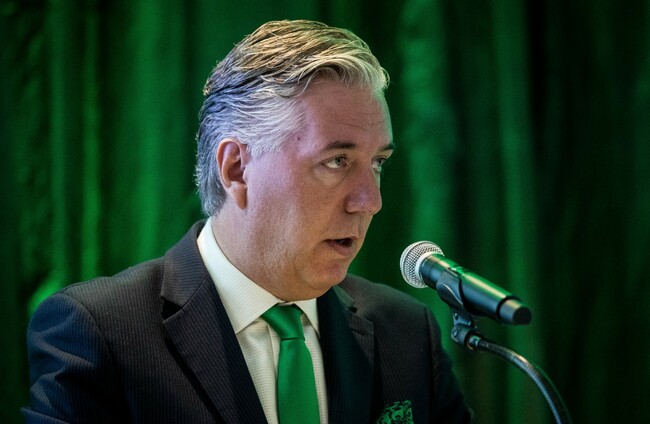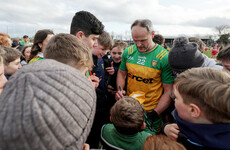UNDER THE OLD Football Association of Ireland regime, many people within the game were ostracised for falling out with people in power.
As ex-Ireland boss Brian Kerr — one of those individuals who fell foul of the association — said on Virgin Media last October of the Delaney era: “The 15 years that he was in control were a disaster for Irish football and for the game. What’s a disgrace – as much as his behaviour – was that so many people on the inside that knew the skulduggery that was going on, did nothing about it. They said nothing about it and went along with taking the bonuses that were coming from being a part of that culture – a very poisonous culture that was in the FAI at the time.”
One organisation who did stand up to Delaney, however, was the Professional Footballers’ Association of Ireland.
“There’s no doubt that there was that element and we were very much on the wrong side of the Delaney ire for a number of years,” PFAI solicitor Stuart Gilhooly says. “We made the mistake — I suppose you could call it that anyway, at the time it certainly seemed that way — of standing up to him and calling him out for what he had done or not done, specifically for League of Ireland football and later on, for women’s international football.”
As a result, relations between the two organisations became deeply strained. According to ‘Champagne Football,’ FAI staff jokingly referred to PFAI offices, located in the same building in Abbotstown, as ‘the Gaza strip’.
We had intermediaries within the game saying: ‘Look, would you not just try to sort it out with John? He’s going to be here for a long, long time and you’re never going to achieve what you want in football, because he’s not going to give you any sort of break here until you publicly apologise for what you’ve done and said to him, until you play ball with him.’ We weren’t prepared to do that. It was just far too far for us.
“We had and still do have a very good relationship with the players and with our members. Part of the reason for that relationship is because we are prepared to stand up to people.
“So for us to go cap in hand and say ‘look John, can we sort things out?’ It just wouldn’t really have worked for us. And it was just something none of us were prepared to do anyway, because we didn’t think we’d done anything wrong.
“We felt all we were trying to do was the best deals for our members and ultimately, we were very glad that we didn’t go down that road, because we were one of the very few people that did stand up to him. Although we paid for it in the short term, I think in the long term it stood us in good stead.”
Gilhooly continues: “I suppose it was an ongoing thing and it probably manifested itself over a number of years. [PFAI General Secretary] Stephen McGuinness gave an example of it. He was responsible for an article that was very critical of the FAI’s treatment of the League of Ireland. He called them in and said: ‘Look, you’re wrong. You have to understand what’s going on here.’ Stephen asked: ‘What do you mean by that?’ He cupped the palm of his hand and said: ‘I have the board in here. I can get them to do whatever I want.’
“That was in 2014. That was the beginning of the end of the relationship between the FAI and the PFAI. It definitely went downhill after that. We became more and more critical of him, of what the FAI was doing for the League of Ireland, i.e. very little, if anything at all. And he didn’t like people standing up to him. Anyone who stood up to him was sidelined. With anyone else, he could either fine them or sack them. But he couldn’t do that with us, because we weren’t his employees and he had no power to fine or suspend us. All he could do was basically give us the silent treatment, and that’s all he did.”
While it ultimately disintegrated, Gilhooly says the relationship between the two organisations wasn’t bad at the start of Delaney’s reign in 2004, when he became FAI CEO.
“Fran Gavin was initially the General Secretary of the PFAI. Fran and himself would have had a good relationship to the extent that he actually poached Fran from the PFAI, and he took over as director of the league.
“I was involved at that stage, but I would have been far more peripheral than I am now. I wouldn’t have had any relationship with him.
Stephen, by the time he took over, until 2013-2014, relations were okay. You could talk to [Delaney], you could have a meeting with him, they may not have been terribly successful and you might not have got anywhere. But you could at least have a conversation and something might have gotten done.
“Whereas I think from the time that article went out and John threatened him, I think that was the end of the relationship in any meaningful way.
“From then, we were always fighting a battle to get any sort of an audience with him. We just didn’t. And that actually, as much as anything else, is why we got the problem with the women’s football team, because he refused to talk to or deal with us. He became more and more entrenched in those ways and I think he saw, in some ways, punishing women’s football was a way of punishing us.
“The other reason, I guess, was because they had no money at the time, as we now know, though we didn’t at the time.”
Gilhooly credits the journalists who were prepared to challenge Delaney and the FAI, but feels not enough was done in the political sphere for a long time.
“Part of the problem with that is sport in general very much remains an afterthought in terms of how government looks at these things. It’s never had its own specific department. It’s always been an add-on to a ministry.
“People came in and out. They were left with having to deal with many different sports. Football is just one of them. There was a turnover of ministers in the position who were being asked to juggle two or three different portfolios, as well as five to seven major sports.
“Asking people to focus on football in circumstances where this guy was very adept at pulling the wool over people’s eyes, it’s possibly a little unfair on a particular incumbent at the time. But I think a lot of people will look back on that time, a lot of ministers will look back on that time and say they probably should have done more and they could have handled it better.”
Gilhooly was an important part of the process when the Irish women’s team launched their infamous protest in 2017.
He memorably described how the women’s team were “the dirt off the FAI’s shoe”. The decision to go public with their unhappiness came after a lengthy period of unsuccessful negotiations.
Ultimately, it paid off, as the Irish side were granted better working conditions.
“You can never say you’re completely satisfied, but we certainly felt that we got as much as could reasonably be expected. It was a very painstaking process. It was months, in fact a little over a year really from when the process began. It got nowhere. We were being stonewalled at every opportunity.
“It really was the press conference that took place in April three years ago that finally got the attention of the public. I think everyone was taken particularly with the phrase about the tracksuits and the women having to change in the toilets et cetera. That really was a very evocative moment, and I think that really changed everything.
“Once that happened, the FAI were very much on the backfoot. But they should never have let it get to that point. And we never thought it would get to that point. We never thought they would actually let it happen, because we thought if you open this door here, you’re going to be very sorry about what’s coming out.
“But because of the leadership, which was used to quashing all insurgents, they thought we’d eventually go away. They learned the hard way that we weren’t going to do that. The women were very determined that they weren’t going to do that, no matter how much they were threatened.
“So the result of it was that it got a huge amount of publicity. The mediation meant that because it was a couple of days after the publicity, they kind of had to reach a resolution. The last thing they wanted was to get back to where we were before, and they needed this thing to go away.
“I still don’t think we got any more than the women deserved and they probably deserve more than they got. But it was still probably more than we realistically expected to get. And I think that’s because of the way the FAI handled it.”
In recent months, the Irish women’s team have been fighting for equal pay to the men’s side in what would be another progressive step, and which Gilhooly feels would be very much deserved.
“They should be on equal pay. And I really expect that that will happen sooner rather than later. A lot of countries around the world now have equal pay for women [in international football]. And there’s no real reason why Irish women should be treated any differently to Irish male footballers. And I certainly think that is something that we are going to keep pushing. And I suppose, once the finances are there, we’ll be looking for that. But in terms of the actual amount itself, it was a success.
“It had a detrimental effect on our relationship with the FAI. It was the final nail in the coffin. What occurred after that was, there was literally no conversation between us and the FAI. They demanded a public apology for my comment about the women being ‘the dirt on the FAI’s shoe’. They were never going to get any apology, much less a public one. So that meant relations were pretty much dead until the time that John left.”
It took great courage for each member of the squad to stand up to the FAI, and Gilhooly affords particular praise to former Arsenal and Ireland goalkeeper Emma Byrne.
She was the person who drove the whole thing. She did it entirely selflessly. She knew that it may affect her career and she also knew she wasn’t going to gain financially from it at all. But she knew that she needed to do it for the next generation. That was her determination. She was very selfless about it the whole way through.”
Speaking more generally, Gilhooly believes the biggest mistake the FAI made over the course of that era was allowing one individual to have too much power.
“If people had stood up to him early on, and said: ‘We’re going to have a proper governance system here, you’re not going to be in charge or you’re not going to determine who is on the board, you’re going to do what we say rather than the other way around,’ then I’d very much doubt we’d be in the position we are now.
“So the biggest problem was not having a proper corporate governance system. Not properly implementing the genesis report and then letting one man run what is Ireland’s biggest and most important sport. But that’s in the past now I suppose. I presume it will never occur again.”
And despite the well-documented financial challenges that the FAI continue to face, Gilhooly says he is “relatively optimistic” with regard to the future for Irish football.
“I do think there has been change. I think we have a board now that has four independent directors, a chairman [Roy Barrett] who knows what he is doing and who has the interests of football and the public at heart and not his own interests.
“We have a new chief executive [Jonathan Hill] about whom we know very little at the minute. But he’s publicly recruited. He’s not one of the old guard in anyway. I think we have to give everyone at the FAI now the benefit of the doubt. And we have to hope and believe with a new corporate governance structure, with a new officer team in place and with a new chief executive in place, that this is going in the right direction.
“But like all of these things, only time will tell and the proof will be in the pudding. We’re in a much better position. The one thing we now know is how bad it was and how bad it got. So we could be in a much better position obviously, but I think that we have refinanced. There are sensible people in charge who will not let what occurred before occur again. But like everything else in the world, we’re going to need things to open up before we can realistically hope to start making money again.
We have a League of Ireland that’s miraculously managed to finish, and I think that’s great credit clubs to all the players that they managed to do that, and also to the FAI, for finding the money to do that.
“But next season is going to require something similar. We don’t know the extent to which there are going to be any crowds at games either. It’s going to be another major challenge to get the money together to get the League of Ireland season up and running again.
“Do I think we’re in a good financial position? I think we’re better than we were, but I think we could be a lot better in the future.
“Certainly it’s a much better atmosphere than it was. We have good working relationships now with the FAI, with the staff and certainly, it’s much more unified and collaborative than it was. I would hope that it would continue and I’ve no reason to believe it won’t.
“I think the common denominator in all this mess was John Delaney. So it’s his departure that gives everyone an opportunity to start again.”
Originally published at 07.30; Updated at 12.00















Any news from the enquires into the FAI’s financial dealings ?
Putting Michael Martin & FF in charge of the economy would be like putting John Delaney back in charge of the FAI in 9 years time! Leo Varadka on M. M.